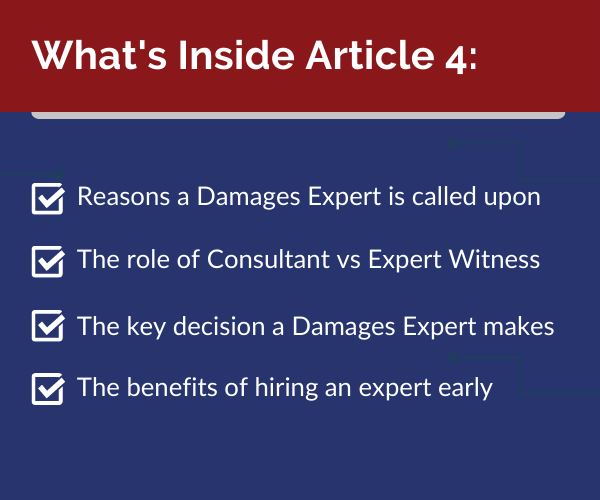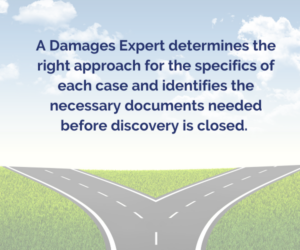
Article 4: What a Damages Expert Does
Welcome back to our series on working with a financial expert in business litigation. If you missed the last article that explored how to find and engage an expert, you can read it here. This time, we’re diving into how an expert determines the approach to apply in a particular damages analyses.

A financial expert is typically called in to determine damages sustained by a business or its owners due to:
- Contract disputes – non-compete agreement, stockholder agreement, buy/sell agreement, operating agreement, confidentiality agreement, employment agreement, and more
- Breach of contract – with suppliers, customers, or employees (including fair dealership interference)
- Intellectual property infringement – patent, trademark, trade secret, copyright
- Dissenting stockholder actions – minority, oppressed stockholder actions
Consultant vs. Expert Witness
As discussed in our earlier article, but worth highlighting—there are real benefits in first hiring a potential expert witness as a consultant. This allows the expert the time to consider different ways to approach calculating damages and early on, assist with identifying the types of documents needed to consider these alternative calculations before discovery closes.
The expert in this consulting capacity, using the documents available to them, can then define the approach(es) they would consider and sometimes even be able to estimate likely conclusions under different scenarios.
When you hire an expert as a consultant prior to being an expert witness for litigation cases, you and your client gain flexibility. After hearing their approach and recommendations based on their preliminary work, you have three options:
- 1. Proceed with engaging/disclosing this expert as your witness
- 2. Choose to not engage them as your witness and look to identify a different expert
- 3. In some cases, this allows you to explain to your client that the cost/benefit of their case may not be worth going forward
How an Expert Approaches Determining Business Damages
In most cases an expert determines business damages based on one of two primary approaches depending upon the circumstances of the particular case:
1. Determining lost business profits; or,
2. Determine lost business value

Typically the damages sustained are measured by the ‘contributory’ profits lost by the business due to the damaging event, or the lost value of the entire business due to the damaging event. This is an either/or situation—the plaintiff cannot be awarded both lost profits and lost business value.
To determine which of these approaches is applicable, the expert will determine whether the alleged damages sustained by the business interrupted a segment or portion of the business—a stream of revenues and related profits; or, if the business was destroyed as a result of the alleged damaging event. If only a segment of the business was damaged or terminated, the present value of the Company’s lost contributory profits is determined. If the entire business was destroyed, the value of the business just prior to the alleged damaging event(s) is determined.
Certain causes of action require consideration of additional damage factors that modify the standard or approach for determining business value or business damages. These include intellectual property actions and dissenting shareholder actions.
Each of these analyses may seem simple on the surface but in fact are quite complex. Atypical or more detailed business reporting may be required to develop a supportable damages or valuation analyses or to defend and counter-argue another’s damage analyses. At a minimum, key financial documents are needed in order to determine lost contributory profits, to develop supportable assumptions relating to the time period of the damages, and to calculate the discount rate used in determining the present value of the damages.
Conclusion
Litigation attorneys engage damages experts or business appraisers for a number of different litigious reasons. The financial expert’s role is to decide which of two primary approaches to apply given the particular circumstances for each individual case. Providing the expert the time and flexibility to identify necessary documents, sometimes more detailed documents and/or business reports that might not otherwise have been secured, is important to considering alternative analyses and conclusions.
Coming up Next Time
Next time, we will do a deeper dive into one of the two primary approaches used by damages experts—determining lost contributory profits.
We’re Here to Help
Hiring the right financial expert can have a significant impact on your case. Based on our firm’s 45+ years of experience focused entirely on determining damages and valuing businesses, we can provide insight, experience and ideas for ways to approach the financial portion of your litigation project that you may not have encountered yet.
Stay tuned to your inbox and follow Capital Valuation Group on LinkedIn as we share more from this series on successfully navigating working with financial experts through each phase of the litigation process. If you have a particular situation you would like to discuss, give us a call. We are happy to have a complimentary initial discussion.
Would you or other people in your firm find value in this series? Please share or they can subscribe to our email list here.

Cathy Durham is a principal of Capital Valuation Group, Inc., headquartered in Madison, WI. Capital Valuation Group has been helping business owners across the country understand, increase and unlock the value of their businesses for over 45 years through keynote speaking, valuation analysis, determining damages and providing expert witness testimony. Cathy welcomes conference and event speaking inquiries and can be reached at cdurham@capvalgroup.com. Phone 608-257-2757
